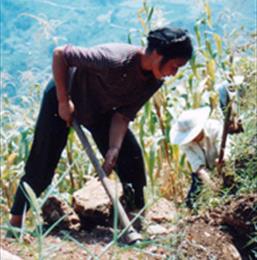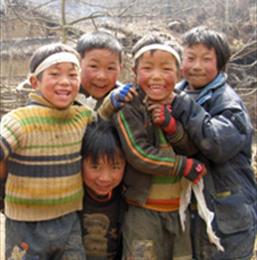Apr/May 2007
31st May 2007
Germany's Misereor Project Villages Comprehensive Evaluation
With the support of Germany’s Misereor Social Development Foundation, Hanyuan County’s Daying Village and Maping Village, and Ganluo County’s Ladai, Wenzeluo, Sanshihu, Shuangmacao, and Shishier Villages’ integrated rural projects are already drawing to an end. In May DORS initiated a comprehensive evaluation. The projects implemented in these villages are different, chosen based on each village’s individual situation. But they mainly include drinking water, livestock sties, roads to households, schools, livestock, breeding, grain grinders, fuel-efficient stoves, and installing telephone lines. These projects have improved villagers’ living environments to a considerable extent. Presently, all of the projects but a couple (not mentioned) are basically running well. We are currently working with the villagers on how to fix those. The animal husbandry and other income-generating projects have not yet developed to the point where they provide obvious economic benefit, but we will continue to monitor these projects.
Shishier Village Animal Husbandry Project
On April 4, DORS examined Shishier Village’s sheep and cattle to check if they’d been vaccinated, and see how they were growing. Afterwards the second installment of project funds was distributed. In addition DORS and the villagers together chose two demonstration households according to the following conditions: they had to have enough space and manpower, have plentiful animal-raising experience, be good at studying new scientific methods of raising animals, have a solid sense of responsibility, and believe they will be able to carry out the project well. Through these two demonstration households DORS hopes to motivate other villagers to carry out the animal husbandry project well, and also hopes the villagers will receive economic benefit from the project.
Shuangmacao Village Fuel-Efficient Stoves Project
At the end of April we checked and evaluated the demonstration stoves project in Shuangmacao. Four stoves were already finished; every stove was very easy to use, but one or two other stoves released some smoke. Even while DORS’ technical engineer Bai Shihai was inspecting the stove, he was able to tell them the solution. The village wasn’t extremely lacking in firewood like some, but DORS’ intent in having these demonstration households was to motivate the other villagers to construct similar stoves, in order to conserve the environment, reduce felling of firewood, and improve sanitation. Because villagers’ stove construction skills were poor, three said they needed to construct a few more with the engineer before they could complete stoves by themselves.
Wanjia Village Stoves Project
From May 10th to 11th DORS checked and evaluated the fuel-efficient stoves project in Wanjia Village. This village’s fuel-efficient stoves project was funded by DORS and implemented by Hanyuan County Poverty Alleviation Office’s Zhang Guoping. Wanjia’s stoves’ outside appearance is no longer only the traditional four-sided, two-wok shape—the majority are now a creative multi-sided three-wok shape. Some of the villagers wanted the platform behind the stove to be a little wider, for a convenient place to put kitchen utensils, whereas Wanjia villagers didn’t want it that wide. These stoves were made by a villager who had just completed the training, Lei Qiang, a youth with great basics in tiling work. This example illustrates the fact that some villagers are especially good at developing skills and being creative.
Shiquan Village Integrated Rural Project
From May 2nd to 3rd we evaluated Shiquan Village’s drinking water, stoves, and forestry projects supported by Mr. Xiong Da Run. Except for three households who live above the spring, the households in the village now have a stable, sanitary source of drinking water. Seven households completed demonstration stoves, and according to surveys, the villagers are all very satisfied. The DORS-supported walnut trees’ growth rates are high, but one or two hamlets’ management of them hasn’t been very good.
Chalin Village Big White Bean Loan Project
On April 26, Chalin Village’s Hamlet 5 villagers requested a sixth round of loans for the big white bean project. Chalin is the most remote of all our project villages and Hamlet 5 one of the poorest hamlets. But that area is one of the best suited to growing big white beans. Starting in 2001 DORS has continuously provided loans for the purchase of stakes for the growing of the beans, in order to expand the area for planting them. This year May 9th we went to Chalin’s Hamlet 5 once again to discuss the loan with the villagers, and we gave them a new round of loans.
The villagers all said our loans helped them a lot, but they still need to continue with them. The major reason is that the villagers’ economic level is too low. Up till now the money earned has all been used for improving living conditions, so there has been little or no profit left over for expanding agricultural production. This time when we went to the village, its appearance was quite different compared with the last few years. The villagers had newly built houses and sties, appliances, and new cattle and mules—indispensable agricultural labor sources. Every year there are some bean stakes that deteriorate. We hope in the near future the villagers will be able to use their earned money to develop, so that the project will achieve sustainability. We are also aware that recently the big white bean output isn’t that great, with bean plants often flowering but not producing fruit. We are currently looking for ways to increase the output of beans and through that, to increase the villagers’ income. If you have any suggestions, please tell us.
DORS News and Information
On April 28, 2007 an American volunteer, Katherine Miller , came to DORS to work. We wish her a smooth transition to Hanyuan and a happy time here.
May 25, 2007 Sichuan Youth Volunteer Internship Program’s supporter organizations came to DORS to meet with us and share experiences of managing a volunteer operation. They also came to learn more about Yang Fangyuan’s work situation, since she is part of all three organizations as a volunteer with the Internship Program.
In April and May we received donations from Guangxi’s Ms. Huang Yuxiu and Beijing’s Mr. Yang Lichun who has donated for the sixth time. In the last few years we have received several donations from generous people in China and abroad, and we will use them in places with the greatest need. We sincerely thank all our donors who care about China’s rural development.


